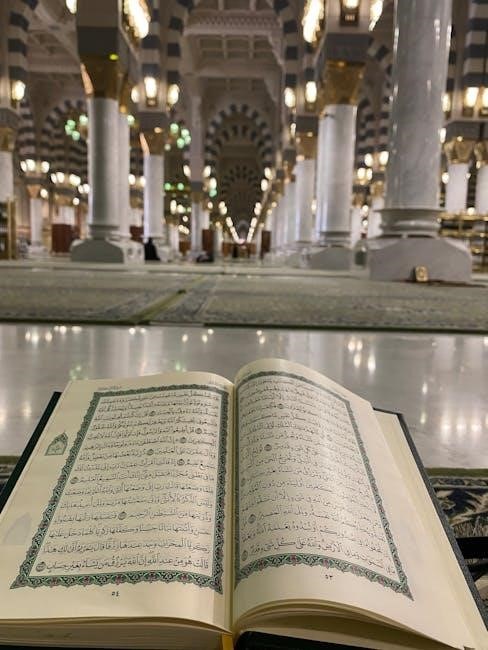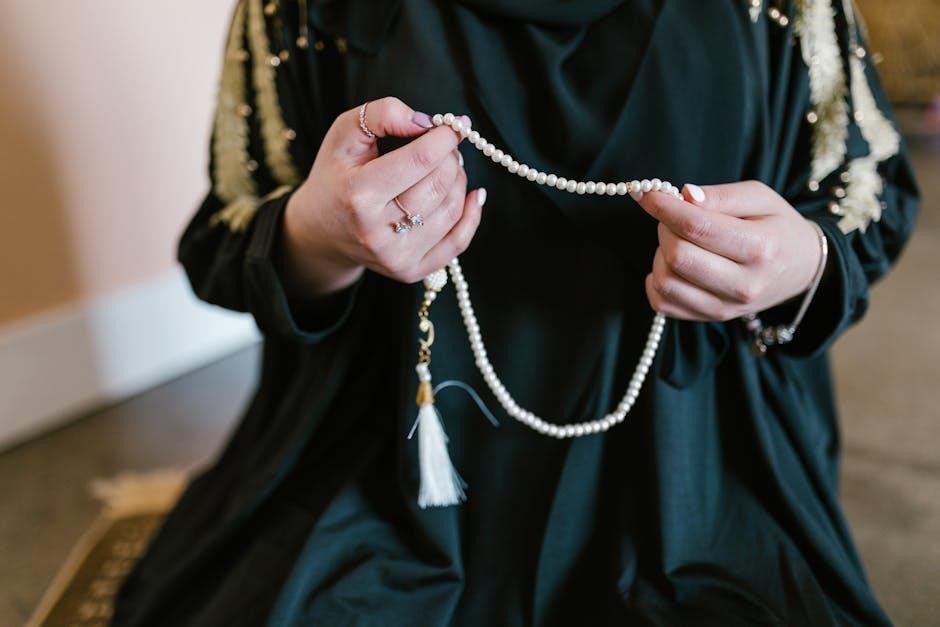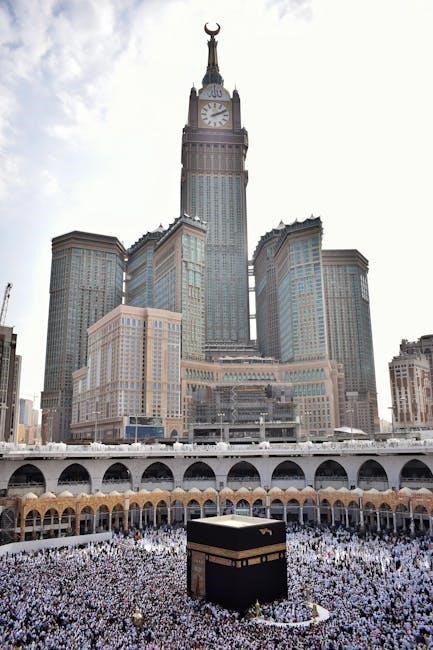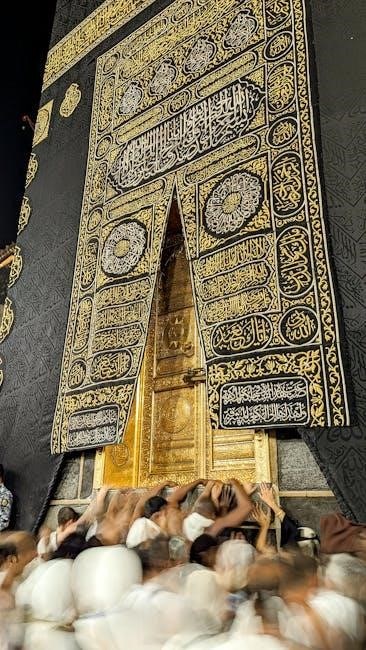Umrah Dua PDF: A Comprehensive Guide for Pilgrims
Embark on a fulfilling Umrah journey with our comprehensive guide! Discover essential duas for every step, from pre-travel supplications to prayers at Safa and Marwa. Access a curated Umrah Dua List PDF for 2025, enhancing your spiritual experience.
Umrah, a sacred pilgrimage to Mecca, offers Muslims a profound opportunity for spiritual cleansing and renewal. Unlike Hajj, Umrah can be performed at any time of the year, allowing devotees to seek divine mercy and strengthen their connection with Allah; Central to this journey is the act of dua, or supplication, which serves as a powerful means of communication with the Almighty.
During Umrah, pilgrims engage in specific rituals, including Tawaf (circumambulating the Kaaba) and Sa’i (walking between the hills of Safa and Marwa). Each step presents an opportunity to offer heartfelt prayers, seeking forgiveness, guidance, and blessings. The Prophet Muhammad (peace be upon him) emphasized the importance of dua, stating that it is the essence of worship.
This guide aims to provide a comprehensive list of essential Umrah duas, carefully selected from the Quran and Sunnah. By reciting these supplications with sincerity and devotion, pilgrims can maximize the spiritual benefits of their journey and draw closer to Allah. Embrace the power of dua and embark on an Umrah filled with meaning, purpose, and divine grace.
What is Umrah?
Umrah, often referred to as the “lesser pilgrimage,” is a significant act of worship in Islam. While not obligatory like Hajj, it holds immense spiritual value and offers Muslims the chance to seek forgiveness, purify their souls, and draw closer to Allah. Unlike Hajj, which occurs during specific dates in the Islamic lunar calendar, Umrah can be performed at any time of the year, providing flexibility for pilgrims worldwide.
The rituals of Umrah are centered around the holy city of Mecca and involve specific acts of devotion. These include entering the state of Ihram, performing Tawaf around the Kaaba, completing Sa’i between the hills of Safa and Marwa, and finally, shortening or shaving the hair (Halq or Taqsir). Each of these acts is accompanied by specific supplications and prayers, enhancing the spiritual experience.
Umrah provides a unique opportunity for Muslims to reflect on their lives, seek repentance, and reaffirm their commitment to Islam. It is a journey of faith, love, and devotion, leaving a lasting impact on the hearts and minds of those who undertake it.
The Importance of Dua During Umrah
Dua, or supplication, holds a central place in the spiritual experience of Umrah. It serves as a direct line of communication with Allah, allowing pilgrims to express their gratitude, seek forgiveness, and request guidance. During Umrah, the heart is more receptive, and the soul is more attuned to the divine presence, making it a particularly auspicious time for making dua.
The Prophet Muhammad (peace be upon him) emphasized the significance of dua in all aspects of life, and especially during sacred journeys like Umrah. The act of supplicating connects the pilgrim to a rich tradition of prophets and righteous individuals who turned to Allah in times of need and gratitude.
Moreover, dua during Umrah is not limited to specific prayers or recitations. While there are recommended supplications for various stages of the pilgrimage, pilgrims are encouraged to make personal duas from the heart. This personal connection with Allah allows for a more meaningful and transformative experience. Seeking forgiveness and guidance through sincere prayer can cleanse the soul and strengthen one’s faith, leaving a lasting impact long after the journey is complete.
Key Duas for Umrah: A Detailed List

Embarking on the sacred journey of Umrah involves reciting specific duas at different stages, enhancing the spiritual experience. This detailed list provides essential supplications recommended during the pilgrimage, serving as a guide for pilgrims seeking to maximize their connection with Allah.
Before commencing the journey, recite a dua seeking Allah’s guidance and blessings for a safe and accepted Umrah; During Tawaf, while circumambulating the Kaaba, supplicate with prayers for forgiveness, mercy, and well-being in this life and the hereafter. Upon reaching the Hajar al-Aswad (Black Stone), saying “Allahu Akbar” is a Sunnah.
At Safa and Marwa, between each round, recite duas inspired by the Prophet’s (PBUH) traditions, expressing gratitude and seeking blessings. Throughout Umrah, remember to include duas for forgiveness, seeking Allah’s acceptance of your pilgrimage and asking for strength to remain steadfast in faith.
This list serves as a foundation, encouraging personal supplications alongside the recommended prayers. Remember, sincerity and devotion are key to an accepted Umrah, making each dua a heartfelt conversation with the Almighty.
Dua Before Starting the Journey
Before embarking on the blessed journey of Umrah, it is crucial to seek Allah’s guidance, protection, and blessings. Reciting a specific dua before commencing the journey demonstrates reliance on Allah and acknowledges His power over all matters. This supplication sets the intention for a spiritually fulfilling pilgrimage.
The Prophet Muhammad (PBUH) recommended reciting particular duas before traveling, seeking safety and ease during the journey. One such dua is: “Allahumma Innee A’oodhu bika min wa’thaa’is-safari, wa ka’aabatil-manzari, wa soo’il-munqalabi fil-maali wal-ahli.” This translates to: “O Allah, I seek refuge in You from the hardships of travel, from the sorrowful sight, and from a bad turn of events in wealth and family.”
Additionally, pilgrims can recite duas asking Allah to grant them a safe and easy journey, to accept their Umrah, and to forgive their sins. It is also beneficial to make dua for family and friends, asking Allah to protect them in your absence.
By beginning the journey with sincere supplications, pilgrims acknowledge their dependence on Allah and invite His blessings for a successful and accepted Umrah.
Dua During Tawaf
During Tawaf, the circumambulation of the Kaaba, pilgrims engage in a deeply spiritual act of worship. While there aren’t specific duas mandated for each round, Muslims are encouraged to supplicate to Allah with sincerity and devotion.
It is a Sunnah to say “Allahu Akbar” each time you pass the Black Stone (Hajar al-Aswad) or its direction. Between the Yemeni Corner (Rukn al-Yamani) and the Black Stone, it is recommended to recite, “Rabbana atina fid-dunya hasanatan wa fil-‘akhirati hasanatan wa qina ‘adhaban-nar,” meaning, “Our Lord, give us in this world [that which is] good and in the Hereafter [that which is] good and protect us from the punishment of the Fire.”
Pilgrims can also recite duas seeking forgiveness, mercy, guidance, and blessings. Some may choose to recite from the Quran or Sunnah, while others may make personal supplications in their own language. The key is to focus on connecting with Allah and expressing one’s devotion.
Remember, the Tawaf is a time for reflection, remembrance of Allah, and heartfelt supplication. Make the most of this opportunity to draw closer to Allah and seek His favor.
Dua at Safa and Marwa
The Sai, the act of walking between the hills of Safa and Marwa, commemorates Hagar’s desperate search for water for her son Ishmael. As pilgrims traverse this path, they remember her faith and reliance on Allah. While specific duas aren’t prescribed for each step, certain supplications are highly recommended.
Upon ascending Safa and facing the Kaaba, it is Sunnah to recite “Allahu Akbar” and “La ilaha illallah wahdahu la sharika lah, lahul mulku wa lahul hamdu wa huwa ‘ala kulli shay’in qadir.” This translates to: “Allah is the greatest; there is no god but Allah, alone, without partner. To Him belongs the dominion, to Him belongs all praise, and He is powerful over everything.”
This dua acknowledges Allah’s oneness, His dominion, and His power. Pilgrims often raise their hands in supplication and make personal duas, asking for forgiveness, guidance, and blessings for themselves, their families, and the entire Muslim community.
Similar duas and supplications are repeated upon reaching Marwa. The act of Sai is a reminder of perseverance, faith, and the unwavering belief that Allah answers the prayers of those who turn to Him.
Duas for Forgiveness and Acceptance
Seeking forgiveness and acceptance from Allah is a central theme during Umrah. Recognizing our imperfections and shortcomings, we turn to Allah with humility, seeking His mercy and pardon. Several duas are particularly effective for this purpose.

One of the most powerful duas is “Astaghfirullah,” which simply means “I seek forgiveness from Allah.” Reciting this frequently throughout the Umrah journey, especially after completing each ritual, is highly recommended. It is a concise yet profound expression of remorse and a sincere plea for forgiveness.
Another beneficial dua is “Allahumma innaka ‘afuwwun tuhibbul ‘afwa fa’fu ‘anni,” meaning “O Allah, You are the Forgiving, You love to forgive, so forgive me.” This dua encapsulates the essence of seeking Allah’s forgiveness, acknowledging His attribute of being the Most Forgiving.
Furthermore, pilgrims can make personal duas, expressing their specific sins and shortcomings, and asking Allah to cleanse their hearts and accept their repentance. Sincerity and humility are key when making these supplications.
The acceptance of Umrah is a profound blessing. To seek this acceptance, pilgrims can supplicate with duas asking Allah to accept their efforts, forgive their sins, and grant them the reward of a blessed Umrah.
Duas from Quran and Sunnah for Umrah

Drawing upon the wisdom of the Quran and the teachings of the Prophet Muhammad (peace be upon him), we find powerful duas that enhance the Umrah experience. These supplications, rooted in divine guidance, offer profound meaning and spiritual benefits.
One such dua, derived from the Quran, is Rabbana ‘atina fid-dunya hasanatan wa fil-‘akhirati hasanatan waqina ‘adhaban-nar, meaning “Our Lord, give us good in this world and good in the Hereafter and protect us from the punishment of the Fire” (Quran 2:201). This comprehensive dua seeks well-being in both realms.
From the Sunnah, we have the Talbiyah, a sacred invocation recited during Umrah: “Labbayk Allahumma Labbayk, Labbayka La Shareeka Laka Labbayk, Innal Hamda Wan Ni’mata Laka Wal Mulk, La Shareeka Lak” (Here I am at Your service, O Allah, here I am. Here I am, no partner do You have, here I am. Truly, the praise, favor, and sovereignty are Yours. No partner do You have). This dua affirms the oneness of Allah.
During Tawaf, pilgrims often recite “SubhanAllah, walhamdulillah, wa la ilaha illallah, wallahu akbar” (Glory be to Allah, praise be to Allah, there is no god but Allah, Allah is the greatest), glorifying Allah’s majesty.
General Supplications and Personal Duas During Umrah
While specific duas are recommended during Umrah rituals, the beauty of this pilgrimage lies in the freedom to offer personal supplications. Beyond the prescribed prayers, pilgrims are encouraged to engage in heartfelt conversations with Allah, expressing their deepest desires, hopes, and fears.
During Tawaf, while circumambulating the Kaaba, use this time to reflect and ask for forgiveness, guidance, and blessings for yourself, your family, and the entire Muslim community. There are no restrictions on what you can ask for; pour out your heart to Allah with sincerity and humility.
Similarly, while walking between Safa and Marwa, known as Sa’i, take advantage of this opportunity to make personal duas. Reflect on the story of Hagar, who desperately sought water for her son Ishmael, and emulate her unwavering faith and reliance on Allah.
Remember, Allah is always near, listening to the prayers of His servants; Use this blessed time to strengthen your connection with Him and seek His infinite mercy and blessings. Let your heart guide your words, and trust that Allah will answer your duas in the best possible way.
Umrah Dua List PDF for 2025: A Comprehensive Collection
To facilitate a spiritually enriching Umrah experience, we have compiled a comprehensive Umrah Dua List PDF for 2025. This meticulously curated collection encompasses essential supplications recommended for various stages of the pilgrimage.
The PDF includes duas for entering Ihram, performing Tawaf, walking between Safa and Marwa, and seeking forgiveness. It also features general supplications derived from the Quran and Sunnah, suitable for recitation throughout the Umrah journey.
The list is designed to be user-friendly, with clear transliterations and translations to aid understanding and recitation. Whether you are a first-time pilgrim or a seasoned traveler, this PDF will serve as a valuable companion, guiding you through the recommended prayers and enhancing your connection with Allah.
Download the Umrah Dua List PDF for 2025 and embark on your pilgrimage equipped with the knowledge and resources to make the most of this sacred journey. May Allah accept your Umrah and grant you His blessings.
Duas for Hajj to recite during Umrah
While Umrah is distinct from Hajj, certain duas traditionally associated with Hajj can also be recited during Umrah, enriching the spiritual experience. These supplications often focus on seeking forgiveness, expressing gratitude, and reaffirming one’s devotion to Allah. Reciting Hajj-related duas during Umrah allows pilgrims to tap into the collective spiritual energy of both pilgrimages.
One such dua is the Talbiyah, a powerful declaration of submission to Allah often recited during Hajj. Additionally, supplications made on the Day of Arafah, a central element of Hajj, can be adapted for recitation during Umrah. These duas emphasize seeking forgiveness and divine mercy.
Furthermore, pilgrims may choose to recite duas expressing their aspirations to perform Hajj in the future, reinforcing their commitment to fulfilling this pillar of Islam. By incorporating these Hajj-related duas into their Umrah, pilgrims can deepen their spiritual connection and enhance the overall impact of their journey.
By utilizing resources such as the Umrah Dua List PDF for 2025, pilgrims can ensure they are equipped with a comprehensive collection of prayers suitable for various stages of the journey. Furthermore, embracing the freedom to offer personal duas allows for a deeply individual and meaningful experience.
Ultimately, the key to unlocking the full spiritual potential of Umrah lies in approaching it with a heart full of devotion and a tongue engaged in constant remembrance of Allah. Through consistent and sincere dua, pilgrims can attain a profound sense of spiritual renewal and draw closer to their Creator.

